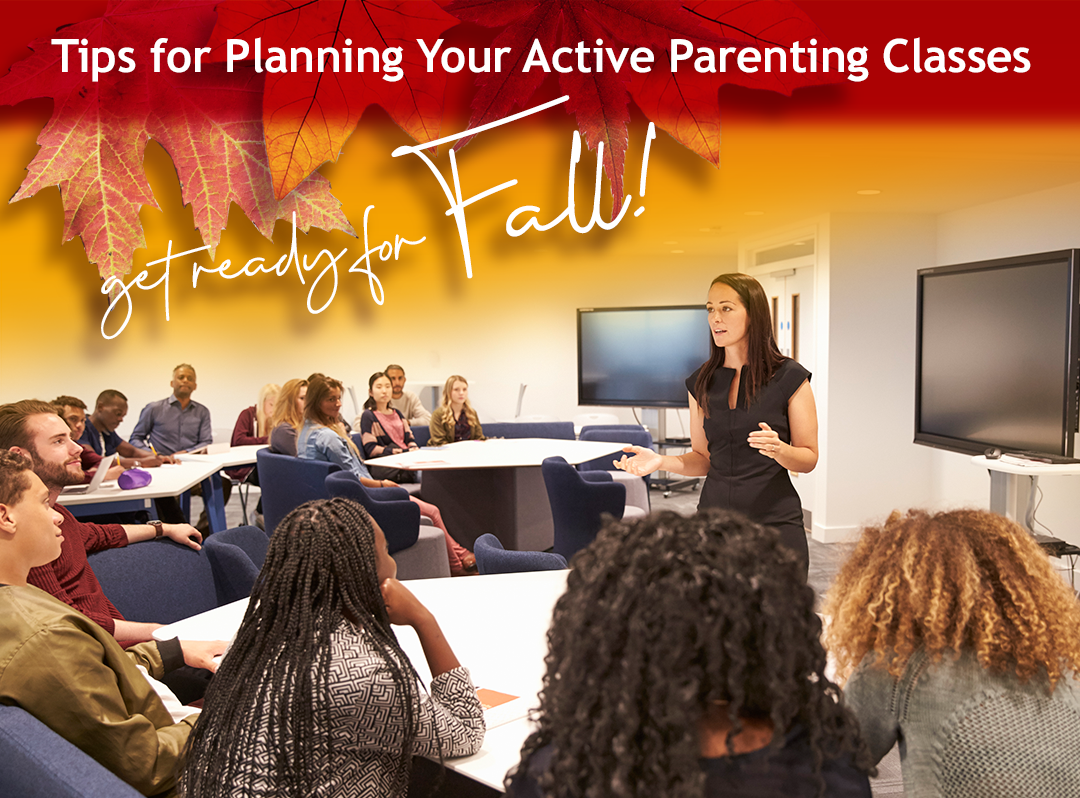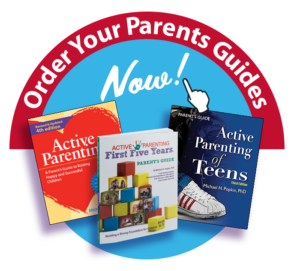
19 Sep Tips for Planning Your Fall Active Parenting Classes
Leading an effective parenting class requires careful planning, organization, and facilitation skills. We’ve collected these tips for planning your Active Parenting classes from experienced Leaders to help you lead a successful class:
 Plan Ahead:
Plan Ahead:
Once you’ve selected a comprehensive Active Parenting curriculum that fits the families you are trying to reach and attended a recommended Leader Training Workshop you’ll need to make decisions regarding logistics and equipment such as:
- Do you need to get permission in your organization to hold a course?
- When, where, and how (in-person or virtually) will you hold the course?

- Equipment: TV/laptop set-up for PowerPoint with embedded video or other set-up. Be sure to test it!
- Who will lead? Arrange for training or other preparation.
- Do parents need transportation or child care?
- What fees will you charge?
- Plan refreshments for the breaks
- Order Parent’s Guides early for all of your participants (you can always return what you don’t use or keep them for your next class.)
- If you are facilitating a virtual class, you’ll need to get familiar with a platform like Zoom.
 Promote Your Class:
Promote Your Class:
Promotion is an important part of having a successful parenting class. Check out our free resources for Promoting Your Class available on our website that will help with the following:
-
- Print: brochure, letter, poster, newsletter, ads
- Internet: email, website, social media, blogs
- Presentation at a parent function
- Personal invitation
- Follow-up calls and other reminders
- Consider incentives (door prizes, free meals, coupons donated from local restaurants or other businesses)
 Be a skilled facilitator:
Be a skilled facilitator:
As the class Leader, your role is to guide the discussions, manage time effectively, and keep the class focused on the topic. If you’ve already taken a Leader Training Workshop you have learned necessary skills such as active listening, asking open-ended questions, summarizing key points, and handling conflicts diplomatically. If you need a refresher, review the Group Leadership skills in the intro of your Leader’s Guide. There’s a lot to remember so organization is key. You can use a class checklist to make sure you have everything that you and your group will need.
Be PREPARED! Before your class:
- Re-read the Parent’s Guide.
- Review the Leader’s Guide while pausing to watch the videos.
- Consider the personal composition of your group and any needs they might have.
- Test all equipment and have a backup plan in case of equipment failure.
On the day of your class:
-
-
- Arrive early to set up.
- Have name tags displayed.
- Greet each parent at the door, sign them in, and give a Parent’s Guide.
- Let them know you are glad to see them.
-
 Foster a supportive and non-judgmental environment:
Foster a supportive and non-judgmental environment:
Create a safe space where participants feel comfortable expressing their thoughts and concerns. As the facilitator, establish ground rules that promote respect, active listening, and confidentiality within the group. Encourage open dialogue (within the time limits of your sessions) and ensure that everyone’s opinions are valued. Offer empathy and understanding rather than judgment or criticism. Maintain a balanced approach and remain encouraging when participants express differing opinions, and focus them on the Active Parenting Model by asking, “What would the program say?”.
 Make it Engaging:
Make it Engaging:
Active learning enhances participants’ understanding and retention of the material. Incorporate the many interactive activities like group discussions, role-playing, case studies, and hands-on exercises that are outlined in the Leader’s Guide. Encourage participants to share their experiences, ask questions, and provide practical examples of the discussed topics. Use visual aids such as posters, flip charts, or a projector to highlight important content. The Leader’s Guide will indicate the points to highlight.
 Provide practical tools and resources:
Provide practical tools and resources:
Assign reading from the Parent’s Guide that supports the class discussion topics. This reinforces the information from the videos, activities, and other components of the course sessions improving the parent’s ability to learn, retain, and apply the skills you’ve taught them. Parent’s Guides not only provide important information during the program but become an invaluable resource for parents to refer to after the course is over.
ADDITIONAL TIPS:
Determine Funding. Before you can even begin to craft an effective parenting class—you’ll need a budget. Is there a budget you can use? If not, consider the following:
- What grants can you seek?
- Who in your organization knows how to find funding for good projects?
- What local groups might fund? (Moose, Elk, Kiwanis?)
- What local sponsors might fund? (Target or other stores, banks?)
- Parent groups?
When seeking funding you will need to build a compelling argument for why money should be spent on your project. Include the following:
- What’s in it for the kids? What’s in it for the parents? What’s in it for the organization?
- How is it cost-effective?
- What is the evidence of effectiveness?
Assign Home Activities. To ensure that parents will be able to transfer the skills they learn in class to their own families assign home activities for parents to complete between class sessions. These can be found in the Leader’s Guide and Parent’s Guide.
Active Parenting Publishers has been providing research-based education programs with an emphasis on nonviolent discipline, mutual respect, and open communication for over 40 years.
STAY IN TOUCH!
Click here to receive the latest news and offers from Active Parenting! And follow us on social media:

 Plan Ahead:
Plan Ahead:
 Promote Your Class
Promote Your Class Be a skilled facilitator:
Be a skilled facilitator: Foster a supportive and non-judgmental environment:
Foster a supportive and non-judgmental environment: Make it Engaging:
Make it Engaging: Provide practical tools and resources:
Provide practical tools and resources: